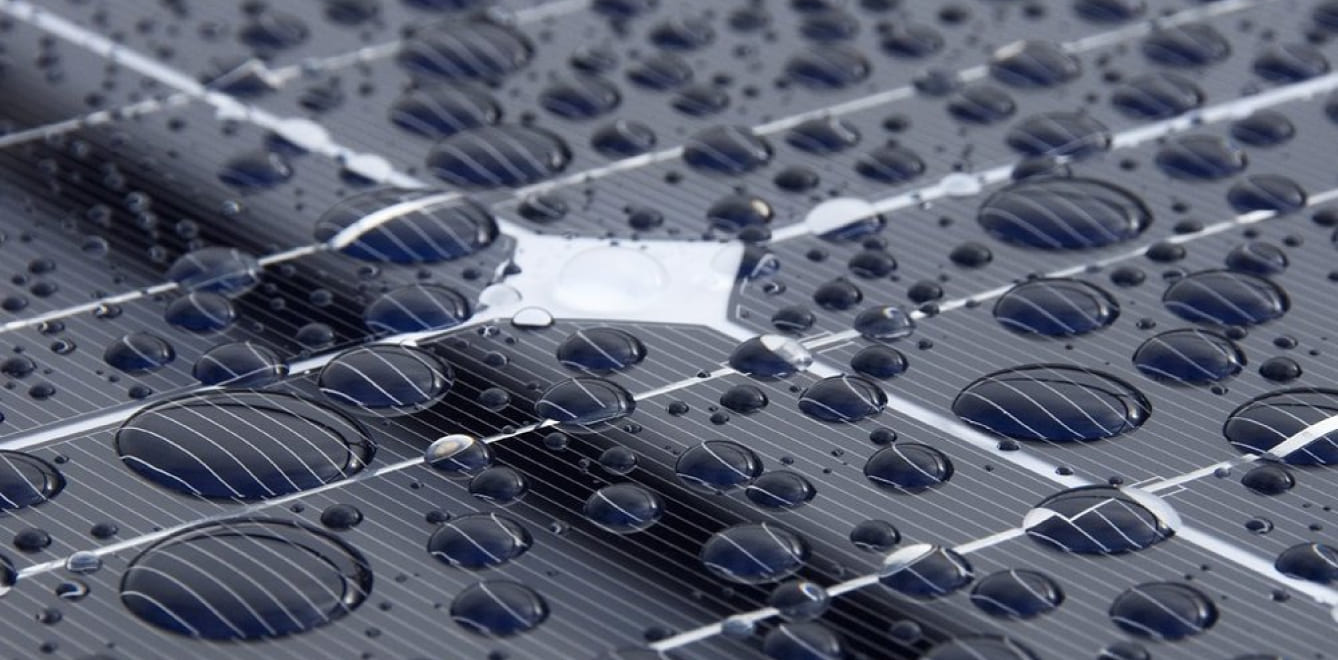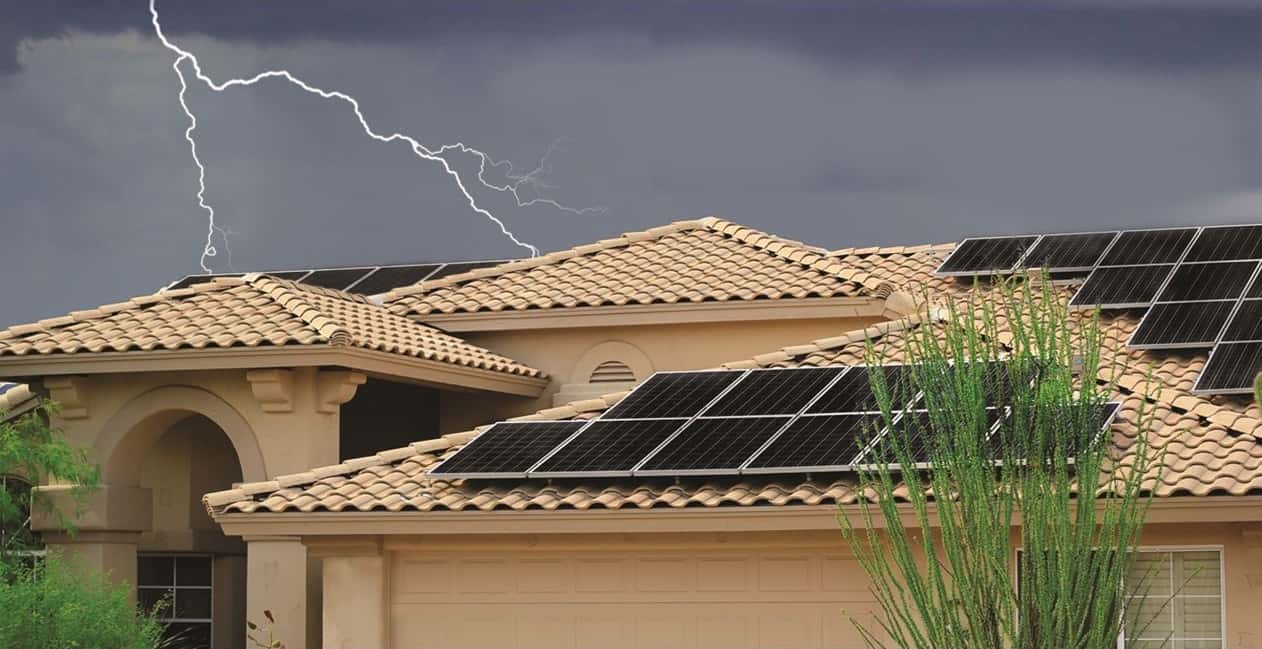Solar panels do not work in rain as they rely on sunlight to generate electricity. In rainy conditions, the panels receive less sunlight, resulting in decreased energy production.
However, there are advancements in solar technology that allow panels to generate energy from diffuse light, such as on cloudy days or in overcast conditions. These innovations have increased the efficiency of solar panels, enabling them to produce some electricity even during rainy periods.
Despite this progress, rain still significantly affects solar panel performance, and it is recommended to have a backup energy source or battery storage to ensure an uninterrupted power supply during prolonged rainy periods.
How Rain Affects Solar Panel Efficiency
One common question that arises when it comes to solar panels is whether they work efficiently in rainy weather. The good news is that solar panels are designed to continue generating electricity even on cloudy or rainy days. However, it’s important to understand how rain affects solar panel efficiency and what factors come into play. In this blog post, we will explore the impact of rain on solar panel performance and delve into the factors that influence their efficiency in rainy conditions.
Factors That Influence Solar Panel Performance In Rain
While rain does have an effect on solar panel efficiency, several factors come into play. Here are some key factors to consider:
- Solar panel tilt: The tilt angle of solar panels plays a crucial role in how rain affects their performance. If solar panels have a flat or low tilt, rain can help in washing away dust and debris, thus improving their efficiency. On the other hand, if the panels have a steeper tilt, rain may not have as significant of an impact.
- Rain duration and intensity: The duration and intensity of rain also influence how solar panels perform. Light rain can have a minimal effect, while heavy rainfall may reduce efficiency due to decreased sunlight penetration and increased surface reflectivity.
- Temperature: Rain can help cooler temperatures, which can enhance the efficiency of solar panels. Lower temperatures can result in better conductivity and reduce energy losses.
- Panel design and quality: The design quality of solar panels and the materials used can affect their performance in rainy conditions. High-quality panels with a durable surface coating are less likely to be affected by rainwater.
Exploring The Impact Of Rainfall Intensity On Solar Panel Efficiency
One of the important aspects to consider is the intensity of rainfall and its impact on solar panel efficiency. While light rain may not significantly affect the performance of solar panels, heavy rainfall can have some consequences. Heavy downpours can create a film of water on the panel surface, potentially obstructing the sunlight and reducing the overall efficiency. Therefore, it’s essential for solar panels to have a tilt angle that helps in shedding water and avoiding pooling.
Does Rain Clean Solar Panels And Improve Their Performance?
A common belief is that rain helps in cleaning solar panels, consequently improving their performance. However, this isn’t always the case. While light rain can indeed clean the dust and debris from the surface, heavy rain can lead to the accumulation of dirt, leaves, or bird droppings. It’s important to note that a dirty panel surface can obstruct sunlight and reduce efficiency. Therefore, regular maintenance and cleaning should still be considered to ensure optimal performance, even in rainy weather.
Rain And Solar Panel Maintenance
Rain and Solar Panel Maintenance
The Importance Of Proper Solar Panel Maintenance In Rainy Conditions
When it comes to solar panels, many people wonder if they are still effective during rainy seasons. It is a common misconception that rain might hinder the performance of solar panels, but in fact, solar energy can still be generated even on cloudy or rainy days. However, it is crucial to ensure proper maintenance to maximize the efficiency of your solar panels in wet weather conditions.
Regular maintenance of solar panels is essential throughout the year, especially during rainy seasons, as rainwater can impact their overall performance. Rainwater can leave residues and dirt on the surface of solar panels, reducing the absorption of sunlight. Additionally, if there is dust, pollen, or leaves accumulated on the panels, rain can cause them to stick and create a further barrier.
Proper cleaning and maintenance are vital to ensure your solar panels remain efficient and produce power even during rainy periods. By following a few key steps, you can help your solar panels work optimally in wet weather conditions.
Key Steps For Maintaining Solar Panels During Rainy Seasons
Cleaning your solar panels regularly is the best way to keep them functioning optimally, especially in rainy seasons. Here are the top steps to follow:
- Inspect your solar panels: Regularly check for any visible dirt, debris, or damage on your panels. Look for any cracks or dislodged parts that need immediate attention.
- Clean gently: Use a soft cloth or sponge and mild detergent mixed with water to clean the surface of your solar panels. Avoid using abrasive materials, as they might scratch or damage the glass surface.
- Remove leaf litter and other obstructions: Clear any leaves, branches, or other materials that may have accumulated on top of your solar panels. These obstructions may prevent rainwater from properly rinsing away dirt and hence hamper the panel’s efficiency.
- Check for loose connections: Ensure all connections between your solar panels and the inverter are secure. Loose connections can affect the panel’s performance, especially when exposed to excess moisture from rain.
- Monitor performance: Keep an eye on the performance of your solar panels during rainy seasons. If you notice any significant decline in energy production, it might indicate an issue that needs professional attention.
By adhering to these key steps, you can ensure that your solar panels remain in optimal condition and continue to generate clean energy even during rainy seasons. Regular maintenance will help maximize the efficiency of your solar panels and enhance their longevity, providing you with long-term benefits.
Innovations In Rainproof Solar Panel Technology
Innovations in Rainproof Solar Panel Technology
Solar panels have long been recognized as an excellent source of renewable energy. However, one question that often arises is whether solar panels can effectively generate power in rainy weather. Over the years, advancements have been made in rainproof solar panel technology, making them more efficient and reliable even during inclement weather conditions. In this article, we will explore the latest innovations in rainproof solar panel technology, focusing on advancements in waterproofing solar panels and the use of rain-resistant solar panel materials.
Advancements In Waterproofing Solar Panels
Ensuring that solar panels remain functional and undamaged under rainy conditions is vital for maximizing energy efficiency. Fortunately, significant advancements have been made in waterproofing techniques for solar panels. Manufacturers have developed innovative methods that prevent water from penetrating the solar panel system, thereby protecting it from damage and ensuring optimal performance even in heavy rainfall.
Here are some key advancements in waterproofing solar panels:
- Improved Encapsulation: Modern solar panels are equipped with advanced encapsulation materials that prevent water ingress. These materials create a reliable barrier, keeping the electrical components of the solar panels safe from moisture damage.
- Tight Sealing: Manufacturers now employ tighter sealing techniques to prevent water from seeping into the panel structure. This ensures that rainwater cannot penetrate and compromise the functionality of the solar cells.
- Enhanced Frame Design: The frame surrounding the solar panel plays a crucial role in protecting it from water damage. Utilizing waterproof and corrosion-resistant materials for the frame’s construction increases durability and longevity, even under constant exposure to rain.
Exploring Rain-Resistant Solar Panel Materials
In addition to waterproofing advancements, researchers and engineers have also focused on developing rain-resistant solar panel materials. These materials are designed to repel water and maintain optimal performance, even when raindrops make contact with the surface of the panels. Let’s explore some of the promising rain-resistant materials being used in solar panel manufacturing today:
| Material | Features |
|---|---|
| Teflon Coating | Non-adhesive surface, preventing water droplets from sticking to the solar panel |
| Hydrophobic Silicon | Repels water and promotes self-cleaning of the solar panel surface |
| Nanostructured Surfaces | Microscopic patterns that minimize the contact area between water droplets and the solar panel, reducing surface tension and enhancing water resistance |
By incorporating these rain-resistant materials into solar panel manufacturing, engineers have been able to mitigate the impact of rain on the panels’ efficiency. As a result, solar panels can now continue generating power, even in wet weather conditions.

Credit: ppm.solar
Optimal Locations For Solar Panel Installation In Rainy Climates
When it comes to harnessing solar energy, rainy climates may present a unique challenge for solar panels. However, it is a common misconception that solar panels do not work effectively in rainy regions. In fact, with the right considerations, solar panels can still be a viable and sustainable energy solution, even in areas that experience frequent rainfall. In this article, we will explore the optimal locations for solar panel installation in rainy climates, taking into account various factors and identifying regions that are better suited for solar panels in such conditions.
Factors To Consider When Installing Solar Panels In Rain-prone Regions
There are several factors that need to be considered when installing solar panels in regions that experience high rainfall. By taking these factors into account, you can maximize the efficiency and effectiveness of your solar panel system, even in rainy conditions.
Let’s take a look at some key considerations:
1. Rainfall Intensity
The intensity of rainfall in a particular region is an important factor to consider when installing solar panels. Areas with heavy rainfall may experience reduced sunlight exposure due to cloud cover. However, it’s worth noting that solar panels can still generate electricity on cloudy days, although at a reduced efficiency compared to sunny days.
2. Sunlight Availability
While it may seem counterintuitive, some rainy areas actually have abundant sunlight when the rain clouds part. In these regions, it is crucial to position your solar panels to capture as much sunlight as possible. This means installing them in a location that is free from any obstructions such as tall buildings or trees that can cast shadows on the panels.
3. Angle and Tilt
Another important consideration is the angle and tilt of the solar panels. In rainy climates, it is recommended to tilt the panels at a greater angle compared to areas with more sunlight. This allows the panels to capture more direct sunlight and prevent rainwater from pooling on the surface, which could decrease their efficiency.
4. Maintenance and Cleaning
In rainy regions, it’s important to regularly maintain and clean your solar panels to ensure optimal performance. Rainwater can wash away dirt and debris that may accumulate on the panels, but it can also leave behind residue, which can reduce their efficiency over time. Regular cleaning will help ensure that your panels are operating at their highest capacity.
Are Certain Regions Better Suited For Solar Panels In Rainy Climates?
When it comes to installing solar panels in rainy climates, not all regions are created equal. Some areas may be better suited for solar panel installation due to a combination of factors. Here are a few regions that are known for their optimal conditions:
| Region | Sunshine Hours | Rainfall |
|---|---|---|
| Southwestern United States | Over 3000 hours/year | Low to moderate |
| Mediterranean | Around 2700 hours/year | Moderate |
| Australia | Over 2500 hours/year | Varies across regions |
In conclusion, while solar panels may work slightly less efficiently in rainy climates, they can still be a viable and sustainable energy solution. By considering factors such as rainfall intensity, sunlight availability, angle and tilt, as well as regular maintenance and cleaning, you can optimize the performance of your solar panel system. Additionally, choosing regions with higher sunshine hours and moderate rainfall can further enhance the effectiveness of your solar panels. So, if you live in a rainy climate, don’t let the rain deter you from exploring the benefits of solar energy.
Myth Vs Fact: Debunking Common Misconceptions About Solar Panels And Rain
When it comes to solar panels, there are many misconceptions and myths that surround their performance in different weather conditions. One such myth is that solar panels do not work properly in the rain. In this article, we will address this belief and analyze the connection between rain and solar panel performance, separating fact from fiction. Let’s debunk the common misconceptions and shed light on the truth about solar panels and rain.
Addressing The Belief That Rain Renders Solar Panels Useless
The prevailing belief that rain renders solar panels useless is a common misconception that needs to be addressed. While it is true that rain can affect solar panel performance to some extent, the impact is not as significant as some might think.
Rainwater does not completely hinder the functioning of solar panels. In fact, rain is beneficial in some ways as it helps to cleanse the panels of accumulated dust, dirt, and debris, improving their overall efficiency. Rainwater can wash away any fine particles or pollutants that may have settled on the surface of the panels, allowing the sunlight to reach the solar cells more effectively.
However, it’s important to note that heavy rain or constant rain for an extended period can slightly reduce the amount of sunlight that reaches the solar panels. In such cases, the reduction in solar energy absorption may lead to a temporary decrease in energy generation. Nonetheless, this decrease is generally minimal and does not render solar panels completely ineffective.
| Myth | Fact |
|---|---|
| Rain causes solar panels to stop working entirely. | Rain may temporarily decrease energy generation, but it does not render solar panels useless. |
| Solar panels cannot operate in cloudy or rainy weather. | Solar panels can still generate electricity from diffused sunlight during cloudy or rainy weather. |
| Rainwater can damage solar panels. | Rainwater helps to clean solar panels, improving their overall efficiency. |
| Rain negatively affects solar panel lifespan. | Properly installed solar panels are designed to withstand rain and have a long lifespan. |
Analyzing The Connection Between Rain And Solar Panel Performance
Now, let’s analyze the connection between rain and solar panel performance in more detail. Solar panels work by converting sunlight into electricity, and while rain does reduce the amount of sunlight reaching the panels, it doesn’t mean they stop working altogether.
During rainy conditions, solar panels can still generate electricity from diffused sunlight. Even though the intensity of sunlight is lower compared to a sunny day, it is still sufficient to produce power. In fact, studies have shown that solar panels can continue to produce up to 80% of their normal electricity output during overcast or rainy weather.
It’s worth noting that advancements in solar panel technology, such as the use of anti-reflective coatings and optimized cell designs, have significantly improved their performance in low-light conditions. These advancements help solar panels capture and convert even the faintest sunlight into usable electricity, making them more resilient to rainy weather.
To maximize the efficiency of solar panels in rainy conditions, regular maintenance and cleaning are essential. Periodic inspections and proper cleaning can help ensure that accumulated debris or water spots on the panels do not hinder their performance. Additionally, installing solar panels at an optimal angle and position can help minimize the impact of rainwater on their efficiency.
- Rain does reduce the amount of sunlight reaching the panels, but it doesn’t render them useless.
- Solar panels can generate electricity from diffused sunlight during rainy weather.
- Advancements in technology have improved solar panel performance in low-light conditions.
- Regular maintenance and cleaning are important to maximize efficiency in rainy conditions.
So, the next time it rains, there’s no need to worry about your solar panels being rendered useless. While rain may have a slight impact on their performance, they are still capable of generating electricity and contributing to your energy needs.
Frequently Asked Questions
Do Solar Panels Work In The Rain?
Solar panels do generate electricity in the rain, although their efficiency may be slightly reduced. Rainwater can clean dirt and debris off the panels, resulting in improved performance once the rain stops. While rain can decrease solar panel output temporarily, the overall impact on their functionality is minimal.
Conclusion
To sum up, solar panels can indeed generate electricity even during rainy days. While the efficiency may be slightly reduced, they are still capable of producing power thanks to the diffused light that filters through the clouds. So, don’t worry about rain affecting the performance of your solar panels—they’ll continue to work and contribute to your green energy goals regardless of the weather conditions!

